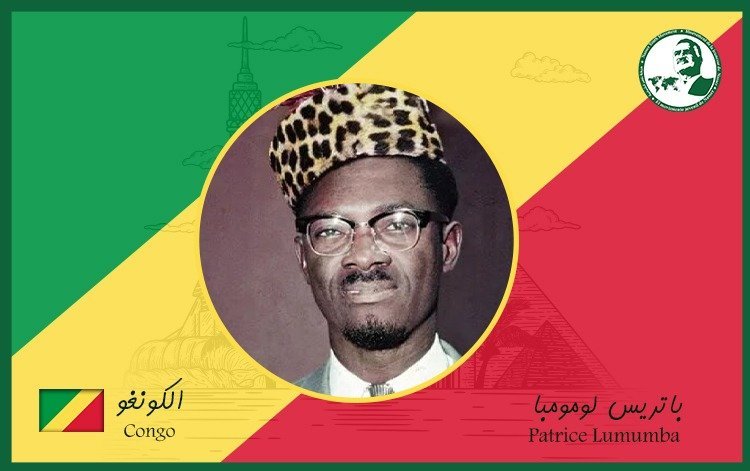Lumumba, head of the Democratic Republic of Congo, Abdel Nasser mourned his death and Che Guevara called him "Martyr of the nation"

Lumumba was not like other young people, he bore in mind the cause of his country and forgot his life for the quest for freedom. Since he was different from others, he succeeded in ending the occupation that lasted more than eighty years. The reason why many Western countries targeted his assassination. He was shot by his closest friend.

Patrice Lumumba (born in 1925) is an African leader from the general public. Coming from a middle-class family, his father's work as a teacher gave him the opportunity to receive an education with some of his peers at a time when the Belgian occupation was preventing the general public from receiving an education. At his work, he was discriminated against, in its most extreme form, between the settlers and the state's population, his patriotic feelings began to move, and he tried to connect between the national forces and the Congolese tribes to demand freedom.
Lumumba resisted Belgian colonialism and founded the National Movement in 1958, Congo's most powerful political movement. Lumumba was very popular and led demonstrations and confrontations against Belgian colonialism, which led to his arrest for six months. He was released after the success of the negotiations held in Brussels on the future of Congo. After his release from prison, he decided to devote himself to political work. His participation in the Accra conference was like his new political birth certificate. This conference -that represented a platform of action for the creation of the Organization of African Unity- witnessed the first appearance of his political personality on the African scene. He was able, thanks to his skill and courage, to make known the cause of the liberation of his country and the concerns and demands of his people to regional and international bodies, and that is why he was arrested again in 1959.

Elections took place in May 1960 and more than 100 parties competed: the national movement led by Lumumba won, while Belgium, which governed the country, tried to conceal the results and transfer power to its ally Joseph Alo. However, public pressure forced Belgium to appoint Lumumba to form the government and the first Congolese elected government was formed on June 23, 1960. The King of Belgium Baudouin officially handed over power to Lumumba. The ceremony marking the transfer of power went through a political crisis, Lumumba delivered a violent speech in front of the Belgians – which was called speech of tears, blood and fire - in which he spoke of the suffering of the Congolese and the injustice and persecution that the people have suffered, which provoked the anger of the Belgian side. The country has known stability for only two weeks and and a series of crises has erupted such as the military rebellion, the separation of some provinces and the labor market troubles. Belgium has prompted Tshombe, governor of the province of Katanga, where the Congolese wealth is concentrated, to declare separation. As a result, Lumumba asked the United Nations to send an international law enforcement force to prevent Belgium from reoccupying his country. He contacted Abdel Nasser, Nkrumah and Sékou Touré, asking them to contribute to the international forces; when UN Secretary-General Dag Hammarskjöld sent a letter to Nasser asking him to involve Egypt in the international forces, he did not hesitate to accept and sent a paratroopers battalion led by Colonel Saad al -Din al-Shazly and the Chief of Staff of the Armed Forces (rank of general) during the October 1973 War.
The events evolved: Lumumba's government was deposed, and Chief of Staff Mobutu seized power in 1961 in a coup d’état and arrested Lumumba and two others of his most important comrades; they were thrown into Belgian prison on January 17, 1961 and were shot dead by Tshombe. Abdel Nasser heard the news of his death on the evening of February 12, confirming the bad news to the world and announcing that he was putting the Lumumba family under the protection of the United Arab Republic. Abdel Nasser has secured all Belgian properties in Egypt, including the Palace of el-Orouba .
After Lumumba's death, Saad al-Din al-Shazli formed two brigades of Sa'ka Forces ( Thunderbolt Forces is an Egyptian military commando force) and placed them at the airport as part of the UN force to which Egypt participated in order to save Lumumba's children and help them come to Egypt, noting that Abdel Nasser wanted to take care of them and teach them the Arabic language.
“Abdel Nasser was deeply affected by the assassination of Lumumba and he exchanged letters about this subject with Khrushchev, Nehru, Tito and Hammarskjöld. He strongly blamed Hammarskjöld, he considered that Lumumba had been killed under the flag and in the presence of the United Nations and that its existence had been exploited as a cover for a heinous crime that shook Africa.” said Heikal. The Egyptian president wrote in a moving letter sent to Nkrumah: “I spend long nights of tears and I feel fire in my heart every time I remember that our troops were there under the United Nations and that the freedom we went to protect was murdered at a stone's throw from us.”

